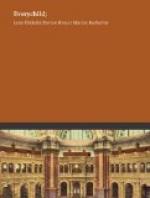Hubert de Burgh took no further notice of them, but dropped into a chair and stared straight before him.
At this point Mr. Literal began rubbing his hands and smiling with pleased excitement. “It seems,” he remarked to the Masked Lady, “that we’re to be in on a really famous event—the slaying of Prince Arthur. It’s a great opportunity of its kind. It will give me a chance to confute the historians who have quarreled among themselves about how the poor boy met his death. How—er—how should you say he dies?”
The Masked Lady replied tranquilly: “He does not die. He lives forever to proclaim to all mankind that the way of kings is an evil way.”
It was now that Hubert de Burgh bestirred himself as if he could no longer bear to be alone with his thoughts. He cried out sharply—“Arthur! Arthur!”
The second door now opened and Prince Arthur appeared: a handsome boy, perhaps fourteen years of age, straight of limb and noble of countenance. He wore a velvet suit, including knee breeches and silk hose and gaiters, and a jacket with a flowing lace collar.
He regarded Hubert de Burgh with dull eyes which slowly began to brighten. “Oh, it’s you?” he cried after a pause. And then, “If you could know how glad I am to see you!” And then, falteringly, “Hubert—when you were a boy, were you ever kept hidden away as if you meant ill to every one?”
And now he approached Hubert with a wistful air, and leaned against his knee, and placed his hand on his shoulder.
But the chamberlain flinched beneath the weight of that light hand. “There, there, Arthur!—take your hand away!” he said. And then, with an attempt to be severe, “We’ll have none of that, you know!”
Prince Arthur pondered, and then his eyes brightened. “I’m glad you said that, Hubert,” he declared. “If you feel that way toward me you can tell me why—why all the others feel so. Every face I look into seems either to pity or to hate me; and I’d so like people to be friendly. Tell me, why must I take my hand away?”
The stern man plucked at his beard thoughtfully; and suddenly he turned to the boy with a quality of stern candor which was a true prince’s due. “Listen, boy,” he said. “It is the fate of kings to tremble at many things: at the too great misery of their subjects, at their too great liberty; at the touch of those who claim to be friends, at the whisper of a foe’s voice. They have taught themselves that they rule by divine right, yet they move by day and by night like any thief who carries booty beneath his cloak when he walks before those in authority, or like one who is wounded unto death who would hide his wound from a strong adversary. Your Uncle John fears you, Arthur, because his throne is yours by right—if there were such a thing as right to any throne. And he has willed that you must die. He has appointed me . . . but there, I must to my task. No struggling, now—no resistence. It will be better so. The king’s will be done.”




